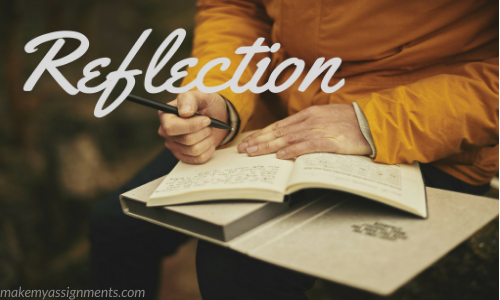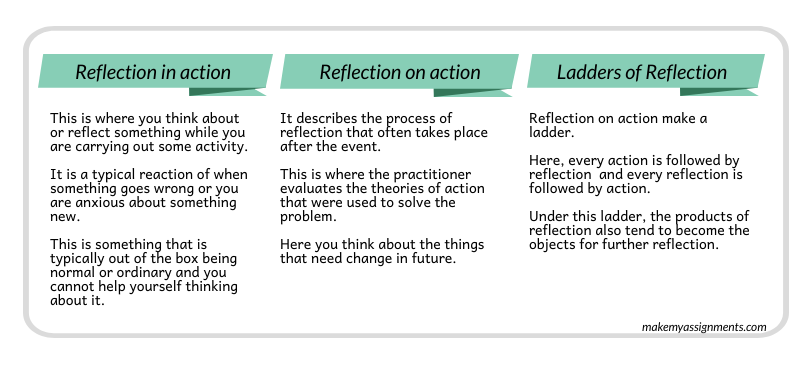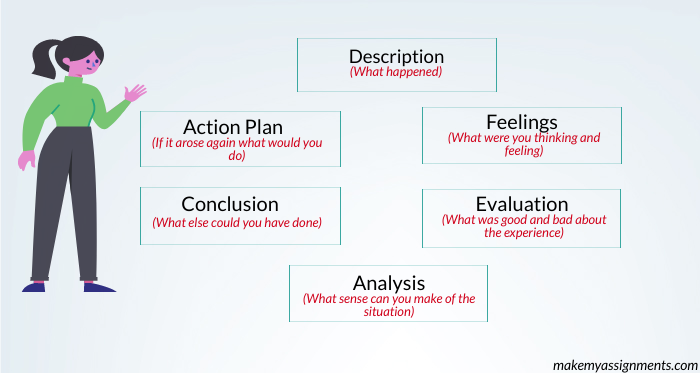
Writing a Reflection Paragraph for your Assignment
In our day to day lives, we often reflect naturally on our situations and circumstances, thinking about things – how they happened, why they happened or whether we handled them well or not. The same goes for the academic writing aspect as well, where you are told formalize your reflections into content to show that learning is taking place at some point or another.
What Reflective writing is,
- A way of thinking where you dive deeper into your knowledge base and explore things for learning.
- A better means for achieving clarity on things and understanding the aspects of what you learn.
- A reflection of your responses to different experiences, events, opinions, thoughts or feelings (here we talk about any new kind of information).
- A golden opportunity for learners to gain self-knowledge.
- A chance to develop and enhance your writing skills.
What Reflective writing is not,
- Pure description of something talked about.
- Simple problem-solving equation.
- Just a mere source for conveying information, facts and arguments.
- A summary of something.
- A pending decision or judgement about something.
“A reflection paragraph or essay simply speaks about something related to your thoughts and opinions, rather than just providing a summary or description of that something.”
Writing reflective paragraphs for your assignment does not simply mean that you provide a gist or summary of something that describes the event and how it happened. Nor does it mean that you pour out everything that you think or feel about it, that too in an unstructured manner. If you want to write the proper reflective paragraphs for your assignment, then you must use relevant examples and evidence for it that can help illustrate the image of your reflections and its analytical approach. Your focus needs to be on providing a clear line of thought to your content.
Models of Reflective Writing
Schon’s model of Reflection in and on action (1983)
Reflection in Action: Thinking ahead, analyzing, critically responding, experiencing
Example
While attending a lecture, there are certain things that cross your mind. This keeps you distracted from the thing being taught in the classroom. On one hand, you want to get the most from your lecture, but on the other, you are not able to focus well because of those distractions. So you need to find a way that helps establish your focus back on studies. Finally, you decide to start making notes of the key points being taught by your teacher.
Reflection an Action: thinking through subsequent situations, discussion, reflective journal
Example
At times, students cannot remember things taught in the lecture soon after the class ends its session. So for next time, you find about the topic being discussed in the classroom and write down questions related to it, to solve your queries. You also make subsequent notes during the lecture to help focus during the class session. Later, you hang out with your friends and classmates and discuss about things being taught in the lecture. This helps you understand the topic more clearly, and you form more valuable opinions regarding it. In the end, you file your lecture notes and related handouts.
Gibb’s Reflection cycle (1988)
Description
- What did you do?
- What was your context?
- Where did it happen?
- What happened?
- How did it happen?
Feelings
- How did you feel?
- What were you thinking about?
Evaluation
- What made you happy/sad about the incident?
- What was good/bad about the event?
- What were your reactions?
Analysis
- Why did things happen the way they did?
- What might have helped or hindered your project?
- What sense can you make out of the situation?
- Are there any ways or perspectives that challenge your views?
Conclusion
- What else could you have done for it?
- What did you learn from it?
- What can you do to change things in future?
Action Plan
- What will you do if you find yourself in the same situation?
- What things would you change next time?
Reflection is a very useful process for students that can help bring out a flawless copy of their assignment. It helps you to make sense out of things and learn from your own experiences and situations. This also allows you to demonstrate the aspect that you can actually think critically about things and your own skills or practice in order to improve and learn in life.
Hope this blog helps you include all those good and well-versed reflective paragraphs in your assignment. Apart from this, if you feel the need to acquire online assignment help from experts, then feel free to contact our online academic writing services for professional help and guidance.


